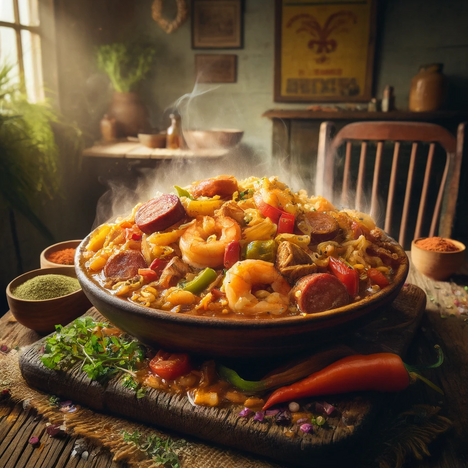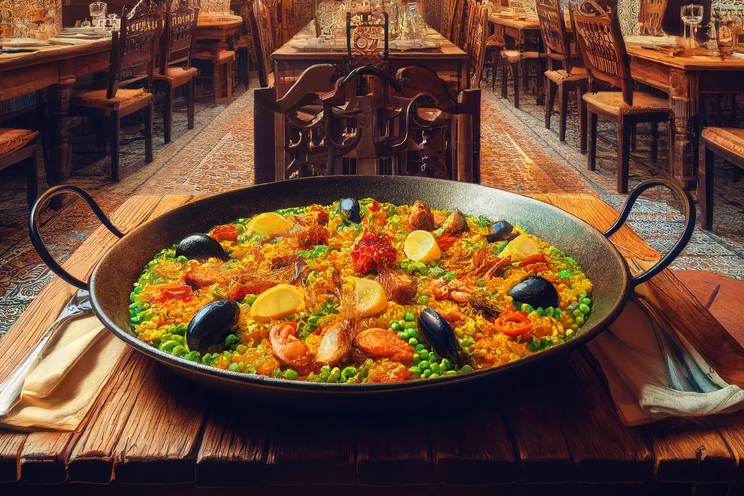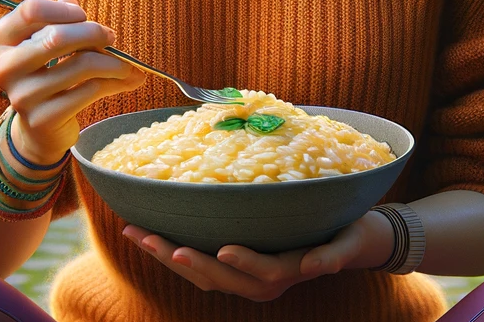Jambalaya

Jambalaya, a hearty and flavorful dish from Louisiana Creole and Cajun cuisine, combines rice, meat, seafood and a variety of vegetables and spices to create a unique taste sensation. While it is a popular meal for humans, the question of whether jambalaya is also suitable for dogs raises some considerations regarding the ingredients and their impact on the health of our four-legged friends. In this article, we examine the traditional jambalaya dish in detail and assess its suitability as part of a dog's diet.
What is jambalaya?
Jambalaya is a versatile, one-pot dish that has its origins in American Southern cuisine. There are two main varieties: the Creole or "red" jambalaya, which contains tomatoes, and the Cajun jambalaya, which does not use tomatoes. Both varieties typically include a combination of chicken, andouille sausage, sometimes seafood such as shrimp, vegetables such as peppers, onions and celery (the so-called "holy trinity" of Cajun cuisine), rice and a rich blend of spices.
Jambalaya in the dog bowl: a good idea?
Advantages
At first glance, jambalaya could offer some potential benefits for dogs, including:
- Protein source: meat and seafood in jambalaya provide high-quality protein, which is important for building and maintaining muscle tissue in dogs.
- Vitamins and minerals: The vegetables included in the dish can be a source of vitamins and minerals that contribute to a dog's overall health.
Disadvantages
However, despite the apparent benefits, jambalaya has several risks for dogs:
- Spices and onions: many spices typically used in jambalaya, and onions and garlic in particular, can be toxic to dogs, leading to digestive upset, anemia or other health problems.
- Pungency: The pungency produced by certain spices is not suitable for dogs and can cause gastrointestinal irritation.
- Fat content: Andouille sausage and other meats in jambalaya can have a high fat content, which can lead to obesity or pancreatitis in dogs.
- Seafood: Certain seafood can be difficult for dogs to digest or cause allergies.
- Salt: High salt content, often found in processed foods, is harmful to dogs and can lead to dehydration and other health problems.
While jambalaya is a delicious meal for humans, it is not suitable for dogs due to its ingredients and spices. The risks far outweigh the potential benefits. For dog owners who want to share their love of southern food with their dogs, there are safer alternatives. A balanced diet designed specifically for the needs of dogs remains the best way to ensure their health and well-being. If you want to give your dog a special treat, choose ingredients that are safe and healthy for them.
If you notice any signs of hypersensitivity or poisoning in your dog, you should see your vet immediately. We are not a substitute for a vet, but we try to be as accurate as possible. Every dog reacts differently and we recommend you get a second opinion or consult your vet if in doubt.
Stay healthy and take good care of your four-legged friend!😊
Similar to Jambalaya
Gumbo is a stew that exists in numerous variations, but typically includes okra, meat or seafood, a hearty broth called roux (a mixture of fat and flour used as a base for the sauce), vegetables...
Paella is a traditional Spanish dish that originated in the Valencia region. The name comes from the special pan in which it is cooked - the paellera. This dish is characterized by its versatility...
Risotto is a northern Italian rice dish prepared by slow cooking special types of rice such as Arborio, Carnaroli or Vialone Nano in broth to a creamy consistency. Traditionally, it is enriched with...
Rice is a grain obtained from the seeds of the rice plant. There are many different types of rice, which differ in shape, color, taste and nutritional value. The best known are white rice, brown...



